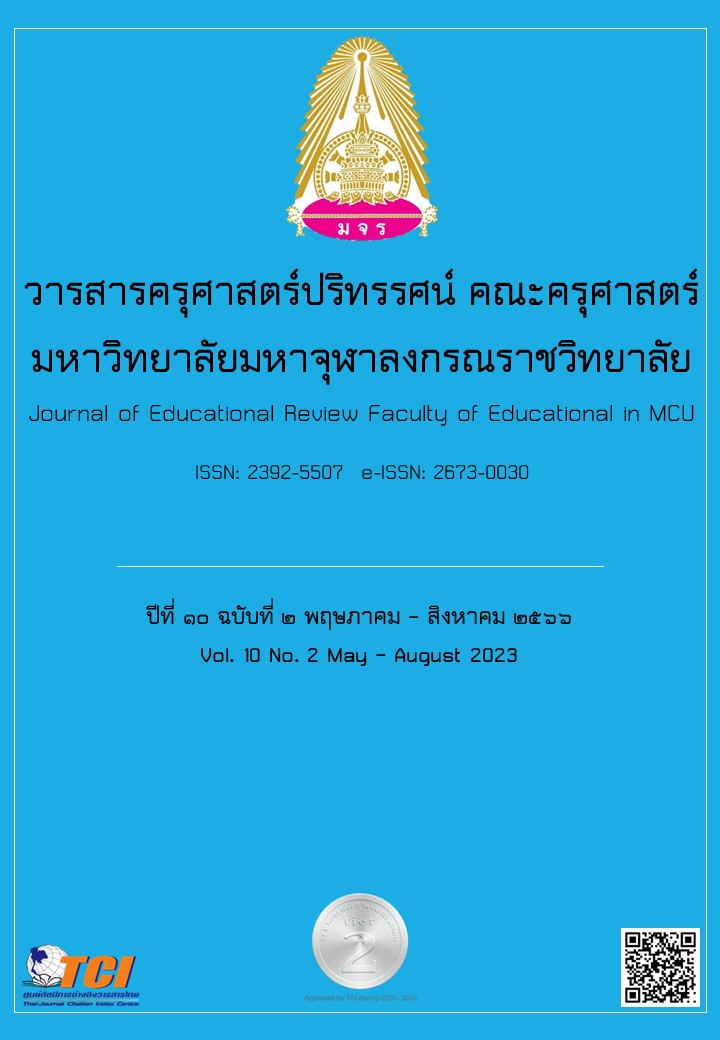SCIENCE PHENOMENA DATA BANK : UPPER SECONDARY LEVEL
Main Article Content
Abstract
The purposes of this research article were to create and assess phenomena data bank related to scientific knowledge for upper secondary level. This is a Basic Research. 4 phases of this study were 1) Choosing natural phenomena and defining the knowledge description 2) Evaluating the suitability for the upper secondary level 3) Creating instructional scenario and 4) Evaluating these scenarios.a sample group of 50 persons for evaluating the suitability phenomena, scientific knowledge and instructional scenarios included of science university teachers, high-school teachers and supervisors with expertise in science. These were selected by a purposive sampling with a rating scale questionnaire. The results of this study indicate that 1) There were 19 phenomena and 19 instructional scenarios suitable for upper secondary level students 2) There were that can be linked to scientific knowledge 2) Every phenomenon and every scenario using scientific knowledge to explain appropriately, consistent with the phenomenon–based learning concept and suitable at the most level for upper secondary level.
Article Details

This work is licensed under a Creative Commons Attribution-NonCommercial-NoDerivatives 4.0 International License.
ทัศนะและความคิดเห็นที่ปรากฏในบทความในวารสารฉบับนี้ถือเป็นความรับผิดชอบของผู้เขียนบทความนั้นเพียงผู้เดียว และไม่ถือเป็นทัศนะและความรับผิดชอบของกองบรรณาธิการ
กองบรรณาธิการขอสงวนสิทธิ์ในการคัดเลือกบทความลงตีพิมพ์และจะแจ้งให้เจ้าของบทความทราบหลังจากผู้ประเมินบทความตรวจอ่านบทความแล้ว
ต้นฉบับที่ได้รับการตีพิมพ์ในวารสารครุศาสตร์ปริทรรศน์ คณะครุศาสตร์ มหาวิทยาลัยมหาจุฬาลงกรณราชวิทยาลัย ถือเป็นกรรมสิทธิ์ของคณะครุศาสตร์ มหาวิทยาลัยมหาจุฬาลงกรณราชวิทยาลัย ห้ามนำข้อความทั้งหมดหรือบางส่วนไปพิมพ์ซ้ำ เว้นเสียแต่ว่าจะได้รับอนุญาตจากมหาวิทยาลัยฯ เป็นลายลักษณ์อักษร
References
จรรยา สุวรรณทัต. (2533) ความเชื่อเกี่ยวกับการเลี้ยงดูลูก เอกสารประกอบการสอนชุดวิชาพัฒนาการเด็กและการเลี้ยงดู. นนทบุรี: มหาวิทยาลัยสุโขทัยธรรมาธิราช.
บ้านจอมยุทธ. (2543). ความหมายวิชาดาราศาสตร์. แหล่งที่มา https://www.baanjomyut.com/ library_2/extension-1/definition_of_astronomy/index.html สืบค้นเมื่อ 22 ก.ย. 2565.
พัชรี บุญศิริ, พจน์ ศรีบุญลืม, ชฏามาศ พิมิจสุนทร, และเปรมใจ อารีจิตรานุสรณ์. (2550). ตำราชีวเคมี. ขอนแก่น: มหาวิทยาลัยขอนแก่น.
สมปรารถนา วงศ์บุญหนัก. (2560) เอกสารประกอบการสอน SWU 142 กระบวนการคิดทางวิทยาศาสตร์. กรุงเทพมหานคร: มหาวิทยาลัยศรีนครินทรวิโรฒ.
PISA Thailand. (2563). ความฉลาดรู้ด้านวิทยาศาสตร์. แหล่งที่มา https://pisathailand.ipst.ac.th/ about-pisa/scientific-literacy/#:~:text=PISA%20ให้นิยามความฉลาด,วิทยาศาสตร์ได้อย่างมีวิจารณญาณ สืบค้นเมื่อ 10 มี.ค. 2565.
Goodman, S. (2021). 5 Steps to Use Science Phenomena More Effectively in Your Classroom. From https://www.knowatom.com/blog/5-steps-to-effectively-use-phenomena-in-your-classroom Retrieved March 10, 2022.
Phenomenal Education. (2015). Phenomenon Based Learning. From http://www.phenomenal education.info/phenomenon-based-learning.html Retrieved March 10, 2022.
Silander, P. (2015). Digital pedagogy. In P. Mattila, and P. Silander. How to create the school of the future: Revolutionary thinking and design from Finland. Oulu: University of Oulu, Center for Internet Excellence.
Valamis Group. (2022). Phenomenon-based Learning: Weaknesses of phenomenon-based learning. From https://www.valamis.com/hub/phenomenon-based-learning#weaknesses-of-phenomenon-based-learning Retrieved March 10, 2022.
Viviana, N., and D. Anna. (2018). The What, Why, and How of Phenomenon Based Learning. From https://www.onatlas.com/blog/phenomenon-based-learning Retrieved March 10, 2022.


